What is the best water filter for your home? It isn’t easy to choose. Years ago, I embarked on a journey to find an alternative to water pitchers and filters that don’t remove toxins from tap water. This complete guide provides tested reviews for water filters that work.
The United States Environmental Protection Agency doesn’t regulate or report on toxins in water like fluoride or aluminum. Their list of ninety contaminants doesn’t begin to touch on the hundreds of toxins in municipal water supplies.
Nearly 77 million Americans got drinking water from systems that violated federal protection in 2015.
—Natural Resources Defense Fund
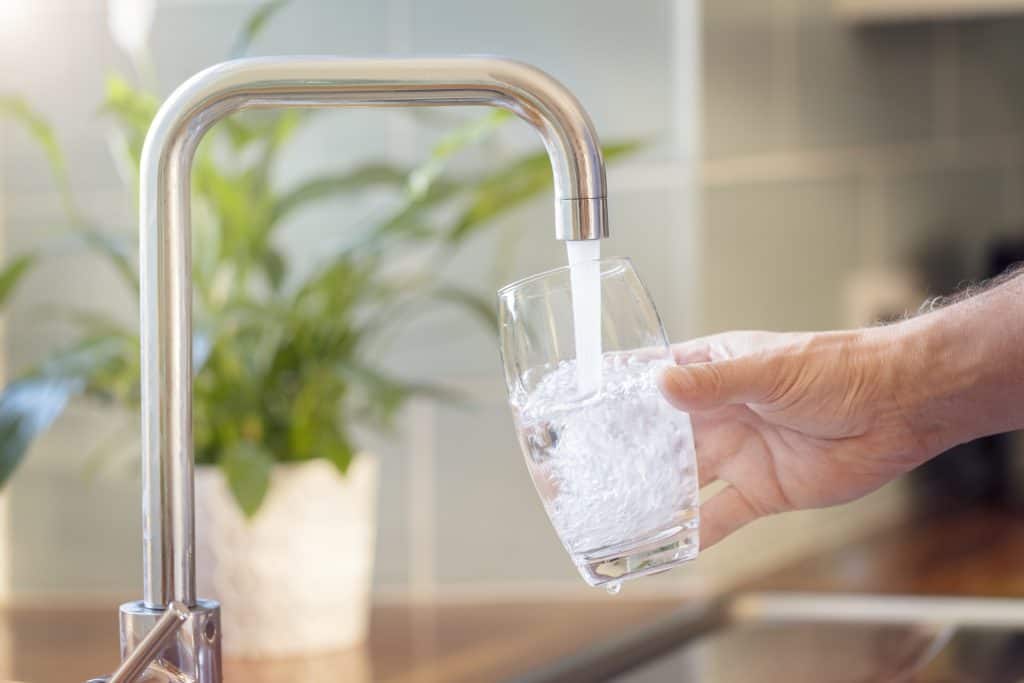
Whether you’re familiar with living a non-toxic lifestyle or new to protecting your family, you’ll learn everything about water—the building block to your family’s health—in this complete guide to water filters.
If you’re beginning the journey to detoxify your home, my other guides are a wealth of information:
- Clean your air with the best air purifier.
- Detoxify your kitchen with non-toxic pots and pans.
- Boost your immune system with healthy habits.
- Choose an organic mattress to reduce your toxic load.
Quick Navigation
Do You Need a Water Filter?
Your city isn’t filtering toxins like aluminum, chlorine, or fluoride, it’s up to you to educate yourself on the dangers of tap water toxins and the best water filter options available.
The EPA hasn’t set a new drinking standard for tap water in almost twenty-five years.
They acknowledge pharmaceuticals and personal care products in the water supply cause reproductive harm and alter hormone levels in animals but pass these chemicals through municipal water supplies.
The EPA remains vague on what particular products could cause harm, but the list is broad. One Geological Survey found antibiotics, caffeine, bug spray, and steroids in over one hundred streams around the U.S.
The Safety of Tap and Bottled Water
If you don’t have a water filter, you likely drink bottled or tap water. The average household spends $100.00 per person every year on potentially contaminated bottles of water that aren’t necessarily safer than tap. Water bottles:
- Can come from city water supplies (and use clever branding to mislead consumers)
- Don’t list their water source or won’t disclose treatment methods
- Aren’t tested as frequently as tap water
Not to mention, cancer-causing compounds and metals leach from water bottles on hot days. To manufacture plastic PET bottles, manufacturers use metals like antimony. One study found antimony in every plastic bottle it tested, with many over the US legal limit. The health effects aren’t well known, but animals exposed to antimony suffered from diarrhea, liver damage, and even death.
Another Harvard University study found a two-thirds increase in the amount of toxic BPA in the bodies of participants who drank bottled water for one week.
If bottled water isn’t safe, what about tap? Depending on your city’s standards, even one glass isn’t safe. While most tap water passes federal and state levels on contaminants. Your tap water may contain:
- Lead from old pipes
- Agricultural runoff from pesticides and herbicides like cancer-causing glyphosate
- The toxic water, stain, and oil repellant PFAS
The Environmental Working Group tested over 32 million tap water samples with disappointing results. Out of 525 chemicals tested, 284 were detected in the water.
To make sure your family is drinking clean, safe water, a water filter is a necessity.
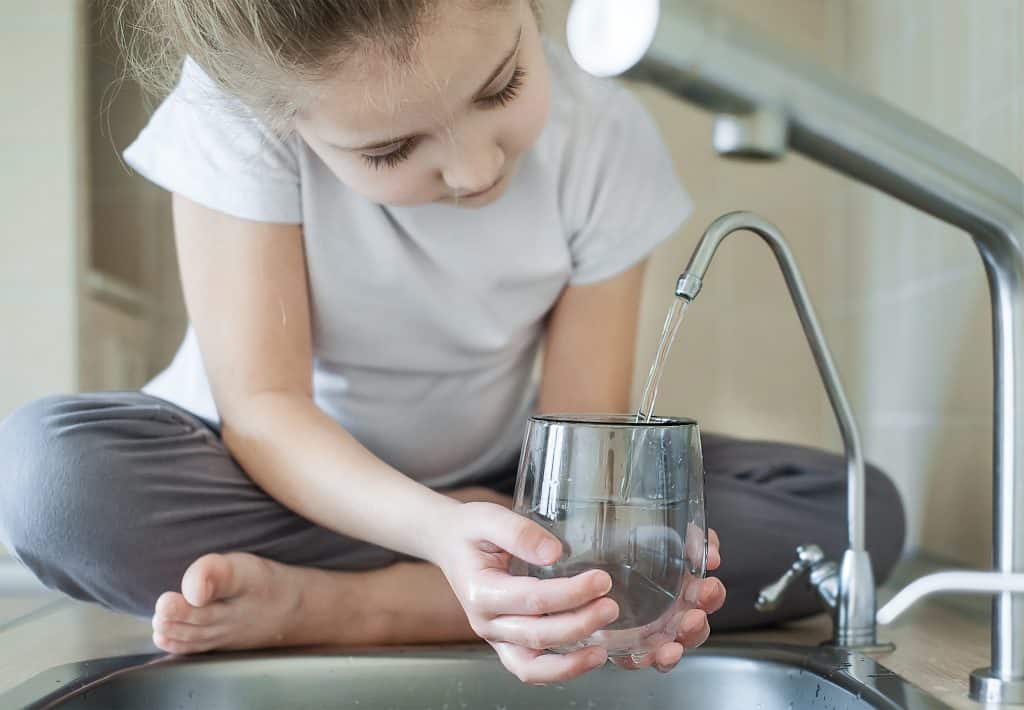
Chemicals in Tap Water: Are They Dangerous?
If you’re mixing baby formula or breastfeeding, a water filter is essential. Toxic water isn’t healthy for anyone, especially pregnant women and children. Before choosing a filter, learn about the top water toxins below; this will help you decide between a whole house, countertop or undercounter system.
Neurotoxins
Neurotoxins are dangerous, especially to children. The American Academy of Pediatrics links neurotoxins to:
- Behavioral problems
- Cognitive delays
- Lower IQ or intelligence
- Low birth weight
The EPA doesn’t consider the neurotoxins fluoride or aluminum as health-threatening. The EWG found aluminum in the tap water of 30 states and fluoride in all of them.
Your family’s health is in your hands when choosing the best water filter to remove neurotoxins. There are dozens of toxins in tap water. The ones below are just some of the most dangerous.
Fluoride
Fluoride is a controversial naturally occurring mineral found in groundwater. Municipal water supplies in all fifty states add fluoride to drinking water, but research shows it acts as a neurotoxin to children in utero.
In a study of Mexican mothers exposed to fluoride while pregnant, researchers found cognitive delays and low test scores in their children.
Lead
Globally recognized as one of the worst neurotoxins for both children and adults, lead is a heavy metal commonly found in old homes. Over the last four years, my lead investigations revealed:
Lead in household items like plates, chords, shoes, and toys.
Lead paint on the Green Sprouts Sippy Cup.
Lead solder on the Planet Box insulated water bottle.
Lead also leaches from older pipes into the tap water in communities all over the United States and the world. Most recently we have seen this in Flint, Michigan.
Aluminum
The United States doesn’t regulate aluminum in the water supply while studies continue to find adverse health effects from aluminum exposure.
An eight-year-long study found a potential link to early dementia like Alzheimer’s in the elderly from exposure to aluminum.
Cancer-Causing Contaminants
Did you know cancer-causing pesticides and herbicides end up in your water supply? The clothing industry and conventional farming are two contributors. Cotton fields used for traditional clothing production contaminate bodies of water and your family with toxic fertilizers.
The EPA doesn’t regulate many of these toxic chemicals, so they’re left in your water. That’s why it’s essential to choose organic clothing brands and a water filter with activated carbon.
A carbon cartridge like the Pure Effect Superblock uses activated carbon particles to trap cancer-causing compounds. Here are some of the most common cancer-causing toxins that Pure Effects removes:
PFAS
Manufactures use PFAS or toxic fluorinated chemicals to produce firefighting foam and water repellent fabrics that contaminate the water supply.
PFAS chemicals are so common that they’ve been found in rainwater and almost every water supply system in the United States. Common water pitchers like Pur or Brita don’t remove these toxins.
Chromium-6
A 2007 two-year laboratory study of rats and mice proves chromium-6 causes cancer in animals. Previous studies also show links to lung and stomach cancer from worker exposure in industrial environments.
The EPA continues to stall chromium-6 regulations while two-thirds of Americans are exposed to this cancer-causing compound from their water supply.
Pharmaceuticals
In addition to pharmaceuticals, creams, lotions, perfumes, and over the counter drugs contaminate the water supply. A 2008 Associated Press report found everything from antidepressants and anti-anxiety medication to painkillers like Valium and synthetic estrogen found in oral contraceptives in the water supply—after water treatment.
Synthetic estrogen in the water supply hurt the fish population, too. A series of studies found male fish causes males to develop eggs in the testes, so what is it doing to developing children?
Sewage treatment plants are not currently designed to remove pharmaceuticals from water. Nor are the facilities that treat water to make it drinkable
Types of Water Filters
There are hundreds of different types of water filters on the market. When I was looking for a water filter for my family, I wanted to be sure it filters every toxin and doesn’t leave the water stripped of minerals.
I own both a whole house Friend of Water and a Pure Effect under-counter sink system. I love both for different reasons. They don’t provide inconsistent results or risks like the common types of water filters below.
Water Filter Pitchers
Most water pitchers are inexpensive, made of plastic, and do a poor job of filtering a large amount of toxins. Only a few pitchers remove lead or chromium. Some NBM readers report having to change the filters frequently.
If you’re short on space or budget, a high-quality water pitcher like the ZeroWater is a good temporary choice. It won’t filter every toxin, but it’s better than drinking water from the tap. We use this when we travel.
Gravity Water Filters
Gravity-fed water filters are a popular and affordable countertop option. They don’t require electricity to work, but they are inconsistent when filtering fluoride, heavy metals, or chloramines. They’re slow to filter and have a limited water capacity.
One popular filter is the Berkey water filter. The company claims to remove all kinds of contaminants, including fluoride. While I haven’t tested this brand first hand, I have seen test reports and it falls short on filtering fluoride.
Berkey’s own testing shows only a 75% percent removal of glyphosate—the most common cancer-causing pesticide.
I don’t recommend gravity water filters based on uncertain test results. There are better whole house and countertop options available at a similar price point.
Reverse Osmosis (RO)
Reverse Osmosis is an expensive and popular choice for water filters, but it’s not the best. The membrane separates any contaminants besides water molecules from passing through, stripping the water of natural minerals and electrolytes in the process.
One study found at least a 60% reduction in minerals like calcium and magnesium when cooking with RO water.
Another downside is water waste. An RO system uses between four and five gallons of water to filter one. These water filters dump the toxic waste water back into the water supply—something I don’t feel comfortable with doing.
Best Water Filters: Reviews and Testing
After looking at the above options, I decided to test two made-in-the USA whole house and countertop filters. I recommend either Friends of Water or Pure Effect for the best whole house water filter. I recommend Pure Effect for the kitchen countertop models. Both companies target the toxins in water without removing necessary minerals.
Take a look at my guide on testing water filters and the pros and cons of each below before deciding what system is best for your home.
Note: The ZeroWater pitcher and Mountain Valley Spring Water bottles are great options to use while waiting for your filter to restock.
Pure Effects: Best Water Filter for Fluoride Removal
Pure Effect is a boutique New York company that specializes in top of the line water filters. I recommend either the Pure Effect countertop or whole house filters for removal of all toxins (currently Pure Effect is back-ordered on their whole house system until late 2020).
Multiple water filter tests from Pure Effects show a 100% removal in fluoride. Pure Effect water filters:
- Are made in the USA, NSF and lead-free certified
- Remove fluoride to non-detectable levels
- Best for rentals and minimalist living
- Remove chemicals, heavy metals, pharmaceuticals, and radioisotopes like Uranium.
- Balance the PH to alkaline (confirmed by water testing).
- Offer countertop, under counter, and whole house filters
- Easy installation—under thirty minutes for countertop
INSERT PURE EFFECT UNDERCOUNTER DISINFECT IMAGE HERE
I like that Pure Effect offers a UV-light for bacteria and viruses since the results of my water testing showed bacteria in my city’s water supply.
The UV system is best in case of resistant microorganisms or water treatment plant failure, according to Igor, the CEO of Pure Effects.
Friends of Water: Best Customizable Water Filter
Friends of Water doesn’t manufacture their own filters, instead, they select the best water filters on the market to offer customizable options for their customers. Timothy from Friends of Water can work with you to choose the best whole house water filter for your needs. I found through testing that Pure Effect has better contaminate removal from their kitchen countertop models.
Friends of Water filters:
- Are made in the USA
- Offer an activated alumina filter (without animal bones)
- Last for up to 80,000 gallons for the whole house water filter
- Use a patented process for longer contact between the water and filter for maximum toxin removal
Final Thoughts on Water Filters
Instead of inexpensive materials or removing minerals, Pure Effect and Friends of Water use parts made out of natural materials like zeolite to leave minerals in and filter toxins out. Before choosing a filter, use a database like the EWG’s to identify the toxins in your water. Then, contact both companies to see which filter is right for you.
Did you find the best water filter for your family? Comment with your experiences and thoughts below, and subscribe to my newsletter for non-toxic living tips and guides for your entire family.
Pin it for later!
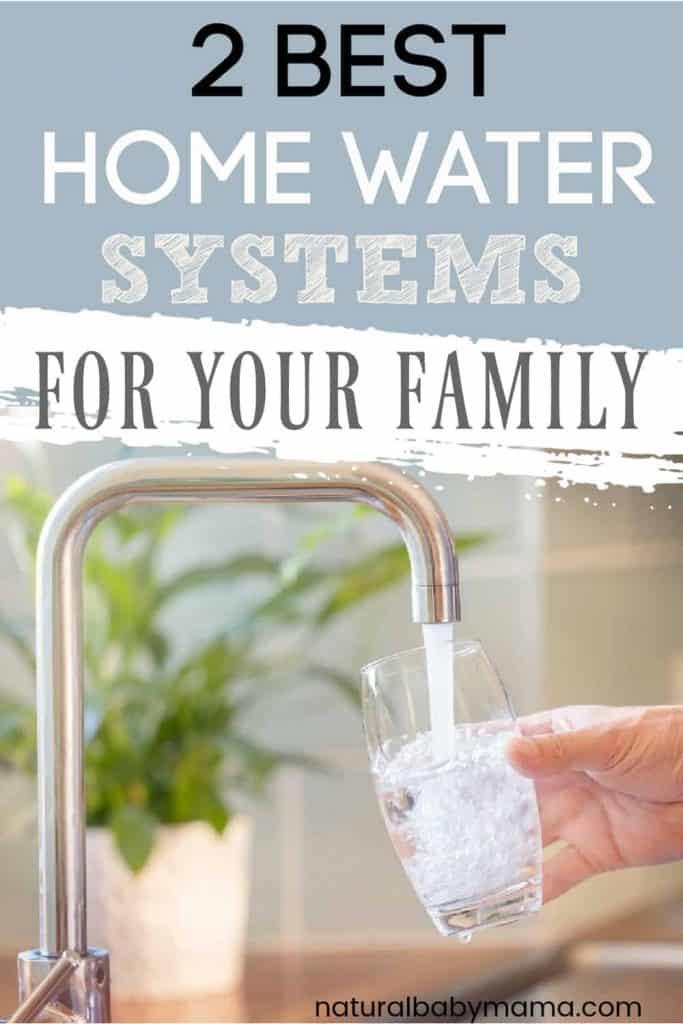
Sources:
- “The Money Spent Can Be Used Better Elsewhere.” The Water Project. thewaterproject.org
- The Natural Resources Defense Council. nrdc.org
- Bashash M, Thomas D, Hu H, et al. Prenatal Fluoride Exposure and Cognitive Outcomes in Children at 4 and 6-12 Years of Age in Mexico. Environ Health Perspect. 19 September 2017. Pubmed.ncbi.nlm.nih.gov
- “How EPA Regulates Drinking Water Contaminants.” Environmental Protection Agency. epa.gov
- “Rainwater in parts of US contains high levels of PFAS chemical, says study.” The Guardian. Theguardian.com
- “Public Health Statement Antimony.” Agency for Toxic Substance and Diseases Registry. December 1992.
- “Pharmaceuticals, Hormones, and Other Organic Wastewater Contaminants in U.S. Streams.” United States Geological Survey. June 2002. www.toxics.usgs.gov
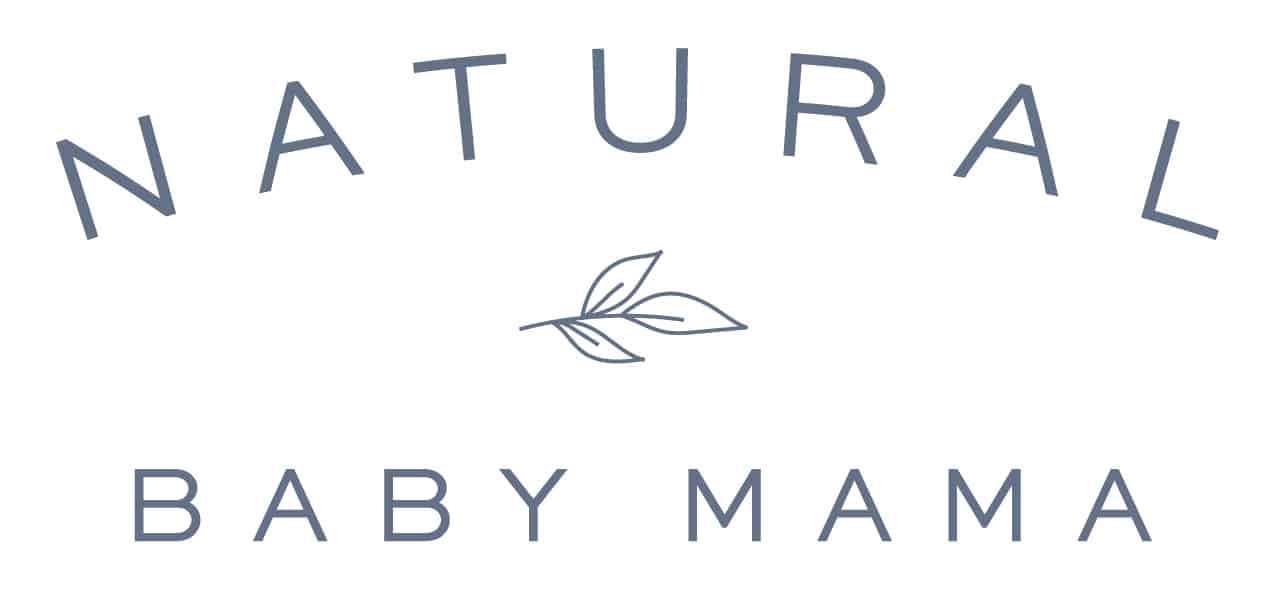

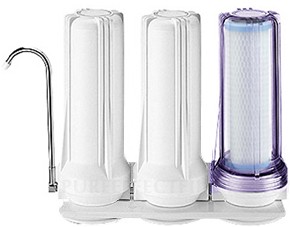
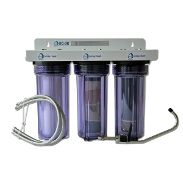



What is the best way you recommend to get my water tested?
I mention in my longer post about water filters that I used two labs. National Testing Labs or Kar Labs. I have also tested at a local water testing facility. You can google water testing and your city and see if anything comes up.
Do you have a recommendation for a bath tub filter? Wanting to filter the water in birth tub at a birth center.
I don’t have a recommendation specifically for a bathtub filter but you can find the vitamin C filters at many health food stores and on Amazon. I don’t know if one is really better than another for these types of filters.
What do you think about aquasana? Thanks!
I haven’t tested it so I can’t really speak to it. I’m familiar with them but that is all. At this point I feel like testing is the only way to know for sure how different filters work.
How is the water flow rate with the PE filter?
I have low water pressure in my house so concerned it will run very slowly
I would call PE and ask him specially how it would work with your low water pressure 🙂
Have you looked into insinkerator filter? I have it for countertop filter with instant hot water dispenser. Thanks
Does it have a filter in it? I have instant hot water as well. I don’t have any information on this brand though, sorry.
Loving my berkey, am so bummed to know it only removes 75% of glyphosate. I wonder if there is a comparative chart showing the results from Berkey, Friends of Water, and Pure Effects.. Will look further into these links. Thanks for the info! We want the cleanest and purest water possible
The testing I have seen and my own personal testing, Pure Effect was the best.
Well worth a read. Got great insights and information from your blog. Thanks.
Hi there!
I’ve just moved to the new house and the water here is so bad. I tested it and the result is that the water contains a lot of lead, thus I extremely want to buy a water filter that could help me improve that bad situation. Could you recommend for me one? Thanks in advance.
I’m sorry to hear about your high lead levels. Between the two I discuss I would go with Pure Effect. That being said I would call the owner Igor and let him know your test results. Depending on how high he might have some additional input. I would definitely test your water again after to make sure it is filtering out the lead.
Okay I got it. Thanks for sharing that.
Hi Shannon, you mention that the Friends of water filter does not use animal products. Does that mean the PE filter does? I was leaning toward getting a PE for our kitchen and now I don’t know. Thanks so much.
Correct, PE uses bone char which I think is why it was more effective at removing contaminants.